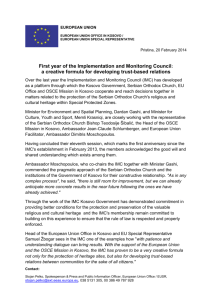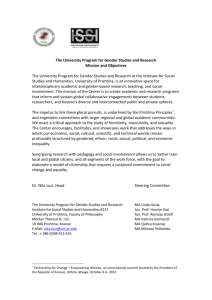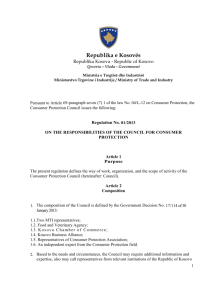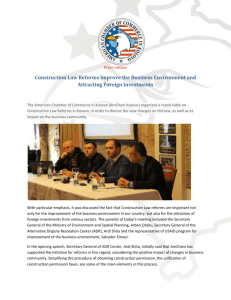Ladies and gentlemen,
advertisement
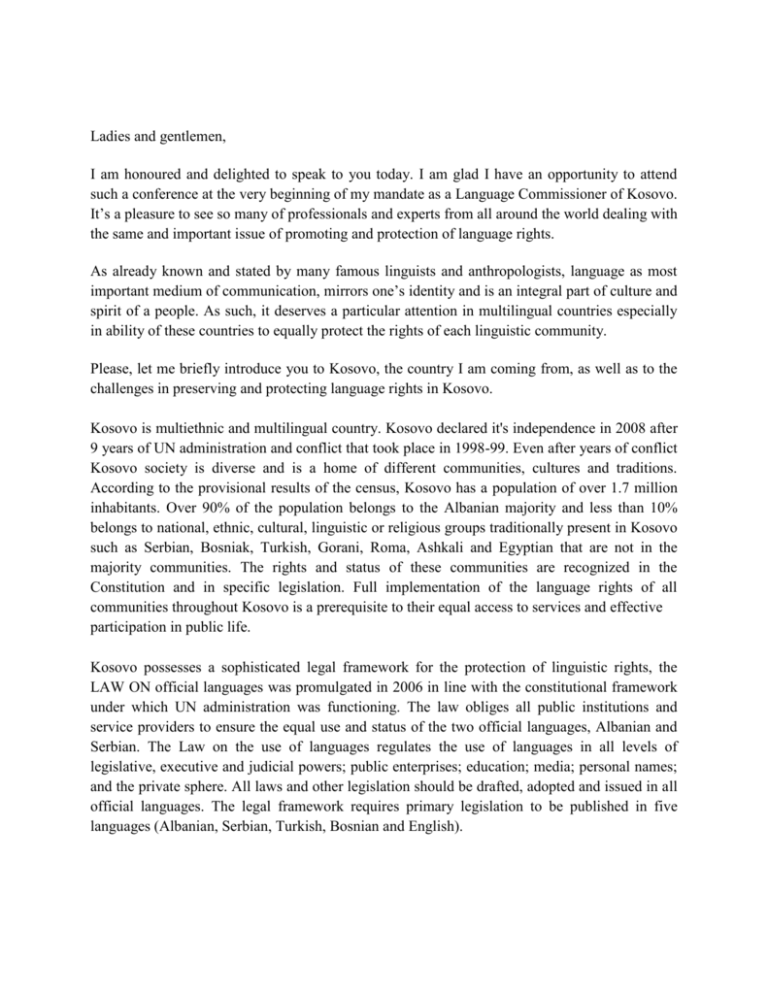
Ladies and gentlemen, I am honoured and delighted to speak to you today. I am glad I have an opportunity to attend such a conference at the very beginning of my mandate as a Language Commissioner of Kosovo. It’s a pleasure to see so many of professionals and experts from all around the world dealing with the same and important issue of promoting and protection of language rights. As already known and stated by many famous linguists and anthropologists, language as most important medium of communication, mirrors one’s identity and is an integral part of culture and spirit of a people. As such, it deserves a particular attention in multilingual countries especially in ability of these countries to equally protect the rights of each linguistic community. Please, let me briefly introduce you to Kosovo, the country I am coming from, as well as to the challenges in preserving and protecting language rights in Kosovo. Kosovo is multiethnic and multilingual country. Kosovo declared it's independence in 2008 after 9 years of UN administration and conflict that took place in 1998-99. Even after years of conflict Kosovo society is diverse and is a home of different communities, cultures and traditions. According to the provisional results of the census, Kosovo has a population of over 1.7 million inhabitants. Over 90% of the population belongs to the Albanian majority and less than 10% belongs to national, ethnic, cultural, linguistic or religious groups traditionally present in Kosovo such as Serbian, Bosniak, Turkish, Gorani, Roma, Ashkali and Egyptian that are not in the majority communities. The rights and status of these communities are recognized in the Constitution and in specific legislation. Full implementation of the language rights of all communities throughout Kosovo is a prerequisite to their equal access to services and effective participation in public life. Kosovo possesses a sophisticated legal framework for the protection of linguistic rights, the LAW ON official languages was promulgated in 2006 in line with the constitutional framework under which UN administration was functioning. The law obliges all public institutions and service providers to ensure the equal use and status of the two official languages, Albanian and Serbian. The Law on the use of languages regulates the use of languages in all levels of legislative, executive and judicial powers; public enterprises; education; media; personal names; and the private sphere. All laws and other legislation should be drafted, adopted and issued in all official languages. The legal framework requires primary legislation to be published in five languages (Albanian, Serbian, Turkish, Bosnian and English). At the same time, languages of other communities traditionally residing in Kosovo may be granted the status of official languages or languages in official use at the municipal level in accordance to conditions prescribed by the Law on the use of languages. OPISI PROCENTE As you can see the law is modern and comprehensive, but what we lack is the implementation. The challenges of use and respect of official languages in Kosovo derive from the fact that we are living in a post-conflict society in which the issue of use of languages is not only the matter of capacities in technical sense, but also the political will and the awareness of public about the importance of the right for every community to use and preserve its language. The challenges in implementation of the Law on Use of languages, that were also mentioned in the reports of various international organization such as OSCE, stated that the main problems are: implementation of multilingual legislation in Kosovo (poor translation of legislation and considerable discrepancies between different language versions of legislation, both at the central and local level, the practice of systematic proofreading is not established amongst legislative institutions). General budgetary restraints in the public sector, understaffing, a lack of qualified translators and insufficient training, along with poor public awareness of the importance of language rights, are major impediments to the multilingual legislation system in Kosovo. Public institutions are still not sufficiently aware of need for the use of official languages; practice of using the official languages in public institutions (web pages, services for citizens, documents) is still at the law level. Communities are facing the problems in using their linguistic rights in everyday life which makes difficult their fully integration in the society. Education is however provided in all levels in both official languages, primary and secondary education is also provided in Turkish and Bosnian. Public service broadcaster has program in Albanian and Serbian, and a separate Serbian channel is beginning to broadcast within a week. As required by the Law on the Use Languages, since 2007 the Government has established a Language Commission to monitor and ensure the implementation of the Law on the Use of Languages, preserve, promote and protect the official languages and their equal status in Kosovo and to ensure protection of the languages of communities whose mother tongue is not an official language. It soon becomes obvious that Language Commission cannot meet its obligations and mandate. Despite its authority under the Law on the Use of Languages, in practice a number of structural factors substantially limit the capacity and effectiveness of the Language Commission: This can mainly be attributed to the fact that the Language Commission carries out its duties and responsibilities without full-time staff budget and adequate resources. There were no specific job descriptions and specifications of competencies required to fulfil the functions of the Commission (complaints handling; investigations; mediation; communications; advice; legal review; reporting, etc.). Due to apparent obstacles and difficulties in fulfilling the obligations that derive from the law on languages, and recommendations of the Thessaloniki conference, in 2011 the Government has decided to focus more on language policy issue and established an inter-ministerial Working Group for the Reform of Language Commission and the drafting of Language Policies. The Working Group was specifically tasked to develop and submit for approval to the government, legal acts and procedures necessary to reform and strengthen the Language Commission, and to ensure the effective implementation of the Law on the Use of Languages. The Reform process was led by the Office of the Prime Minister for Community Affairs. In order to ensure transparency and quality of the process, the international stakeholders such as relevant embassies in Kosovo, OSCE, UNDP, European Commission, were invited to participate in the working group in capacity of observers. I am using this opportunity to specially thank to Mr. Seán Ó Cuirreáin, the Irish Language Commissioner who supported this process very much by providing significant advice and contribution. The Policy Paper on the Language Commission Reform was based on best examples on practices related to the functioning of the Office of the Language Commissioner in Ireland, the Office of the Language Commissioner in Canada. The practices of Ireland and Canada demonstrate the efficient functioning of a Language Commission lead by an independent Language Commissioner, supported by full-time professional managers/advisers and technical staff. In April 2012 the Government of Kosovo adopted the regulation on the establishment of the Office of the Language Commissioner. According to the regulation the competencies of the language commission are transferred to the new office, and the commission itself ceases to exist. The Office of the Language Commissioner in Kosovo has authority to monitor compliance with the Law by any institution under its jurisdiction; Take all necessary measures within its authority, including through mediation, to ensure compliance with the Law by any institution under its jurisdiction; Request, obtain access to and review files of institutions, enterprises or organizations under its jurisdiction; Investigate any complaint submitted to the Office by any natural or legal person, into any failure by a public body or institution under its jurisdiction to comply with the Law; Carry out investigations on its own initiative to ensure that an institution, under its jurisdiction is complying with the provisions of the Law; Issue recommendations on remedies required and recommendations for redress on conclusion of an investigation; As a last resort, when recommendations of the Office on remedies or for redress or compensation have not been addressed by the relevant institution, issue and impose any sanctions as prescribed by the applicable Administrative Instruction on Determining Administrative Sanctions for the Violation of the Law on the Use of Languages; Where necessary, in case a person fails or refuses to comply with the requirements of the Office or hinders or obstructs the Office in the performance of its duties, or where the nature of the violation so warrants, the Office may initiate legal or disciplinary procedures through the relevant authority against the person or the organization responsible for the violation. Office submits bi-annual reports to the Language Policy Board, and annual reports to the Government and the Assembly of Kosovo. These reports shall evaluate the implementation of the Law. As the Language Commissioner I assumed the duty in January 2013. as the first person to hold this position. The Office has the following functions and full-time positions: Language Commissioner, Coordinator of Investigations, Coordinator of Communications, Coordinator of Compliance Assurance, Communications Officer, Senior Legal Officer and Senior Capacity Development Officer; Administrative Officer. The Office of the Language Commissioner is established within the Office of the Prime Minister but the plan is to be an independent office like an Ombudsperson. To enhance the effectiveness of the Office of the Language Commissioner, two support mechanisms are established – A Language Policy Board shall act as a language policy forum receiving and discussing the implementation of recommendations of the OLC and shall provide the Language Commissioner with greater opportunity to contribute to the development and implementation of effective language policies by relevant decision makers; the board is composed of the representatives of the different line ministries (education, communities, public administration, local government administration) academia, assembly, police, and linguistic communities present in consultative council. A Language Policy Network shall ensure that institutions appoint liaison officers or focal points with whom the OLC shall be able to cooperate to ensure a better implementation of language policies. To assist the assessment and enhancement of the translation and interpretation capacities of institutions under the jurisdiction of the OLC, the Language Policy Network shall also include a roster of language assistants employed by such institutions. The Language Policy Network and the OLC may coordinate with responsible institutions in-service training and professional development programs for language assistants registered in the roster. The Office of the Language Commissioner is still in process of establishment and recruitment of staff. Since the Office is new requires additionally support in order to develop specific professional sectors of the Office and create a sustainable and professional base in dealing with language issues in Kosovo. We are currently investing efforts on visibility of the Office, how to bring it closer to the citizens as their service, informing them on their linguistic rights, establishment of regular collaboration with all institutions at the central and local level as well as with international stakeholders who providing us necessary support in strengthening the capacity of the Office. Bearing in mind this is a long term process and as such requires continuous hard work and investment in many different fields and collaboration with all stakeholders in society in order to achieve fully implementation of law on use of languages and allow each community to use and preserve their languages. According to that, formation of an International Association of Language Commissioners will be of great importance for the Kosovo Office of the Language Commissioner as a valuable forum of communication and sharing of experience and best practices on language rights and language policy and planning. The forum we will provide us opportunity to have more intensive discussion on many issues relevant for improvement of language rights as well as it contribute to raising awareness of multiethnic and multilingual countries about importance to develop qualitative language policies. I looking forward to hear more about your experience, challenges and ways overcome them. This is very special opportunity for me, and I am happy to start my mandate as Language Commissioner by sharing experience with Commissioners from countries that achieve great results in field of protecting and promoting language rights. Once again, special thank to Seán Ó Cuirreáin and his effort to organize this significant event as well as for continuous contribution and support to the language policy in Kosovo. I would like also to thank the OSCE Mission to Kosovo who organized this study visit for us and to thank the Office of the Prime Minister for Community Affairs who was leaded the language policy reform process in Kosovo.


